Entrepreneurship and Small Business: Venture Analysis Report, Sem 1
VerifiedAdded on 2023/01/12
|12
|4115
|100
Report
AI Summary
This report on Entrepreneurship and Small Business Management provides a comprehensive overview of different entrepreneurial ventures, including survival, lifestyle, managed-growth, and aggressive-growth ventures, and their relationship to entrepreneurial typology. It explores the differences and similarities between these business types, highlighting the impact of micro and small businesses on the economy, supported by statistical data. The report also discusses the importance of small and micro businesses for the growth of the social economy. Furthermore, it identifies the characteristic traits and skills of successful entrepreneurs, differentiating them from other business managers, and analyzes the entrepreneurial personality, motivation, and mindset. It uses examples of successful entrepreneurs like Elon Musk and Steve Jobs, and examines how background and experience can influence entrepreneurial success. The report culminates in a detailed analysis of the core concepts of entrepreneurship and its practical applications.

Entrepreneurship and Small
Business Management
1
Business Management
1
Paraphrase This Document
Need a fresh take? Get an instant paraphrase of this document with our AI Paraphraser
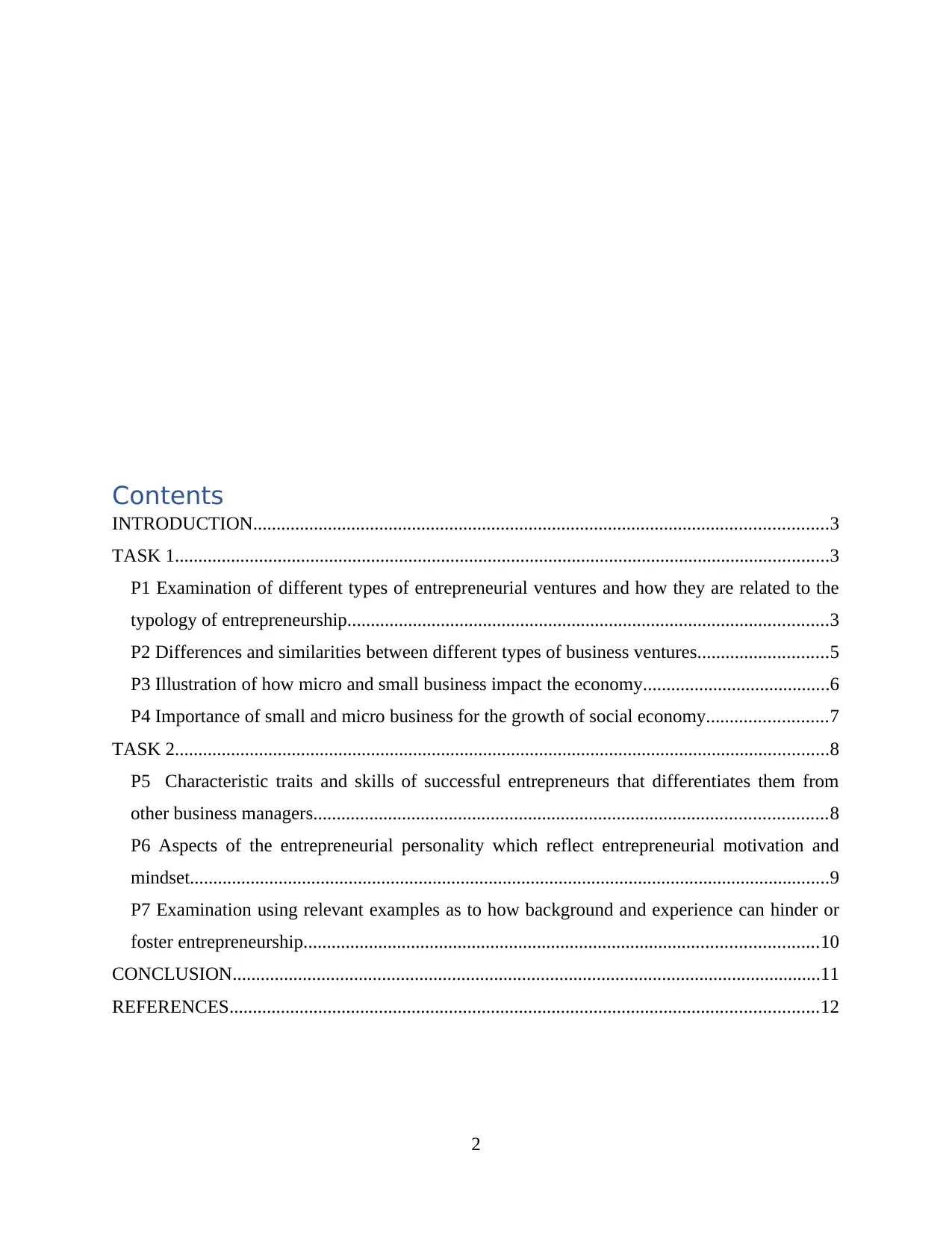
Contents
INTRODUCTION...........................................................................................................................3
TASK 1............................................................................................................................................3
P1 Examination of different types of entrepreneurial ventures and how they are related to the
typology of entrepreneurship.......................................................................................................3
P2 Differences and similarities between different types of business ventures............................5
P3 Illustration of how micro and small business impact the economy........................................6
P4 Importance of small and micro business for the growth of social economy..........................7
TASK 2............................................................................................................................................8
P5 Characteristic traits and skills of successful entrepreneurs that differentiates them from
other business managers..............................................................................................................8
P6 Aspects of the entrepreneurial personality which reflect entrepreneurial motivation and
mindset.........................................................................................................................................9
P7 Examination using relevant examples as to how background and experience can hinder or
foster entrepreneurship..............................................................................................................10
CONCLUSION..............................................................................................................................11
REFERENCES..............................................................................................................................12
2
INTRODUCTION...........................................................................................................................3
TASK 1............................................................................................................................................3
P1 Examination of different types of entrepreneurial ventures and how they are related to the
typology of entrepreneurship.......................................................................................................3
P2 Differences and similarities between different types of business ventures............................5
P3 Illustration of how micro and small business impact the economy........................................6
P4 Importance of small and micro business for the growth of social economy..........................7
TASK 2............................................................................................................................................8
P5 Characteristic traits and skills of successful entrepreneurs that differentiates them from
other business managers..............................................................................................................8
P6 Aspects of the entrepreneurial personality which reflect entrepreneurial motivation and
mindset.........................................................................................................................................9
P7 Examination using relevant examples as to how background and experience can hinder or
foster entrepreneurship..............................................................................................................10
CONCLUSION..............................................................................................................................11
REFERENCES..............................................................................................................................12
2
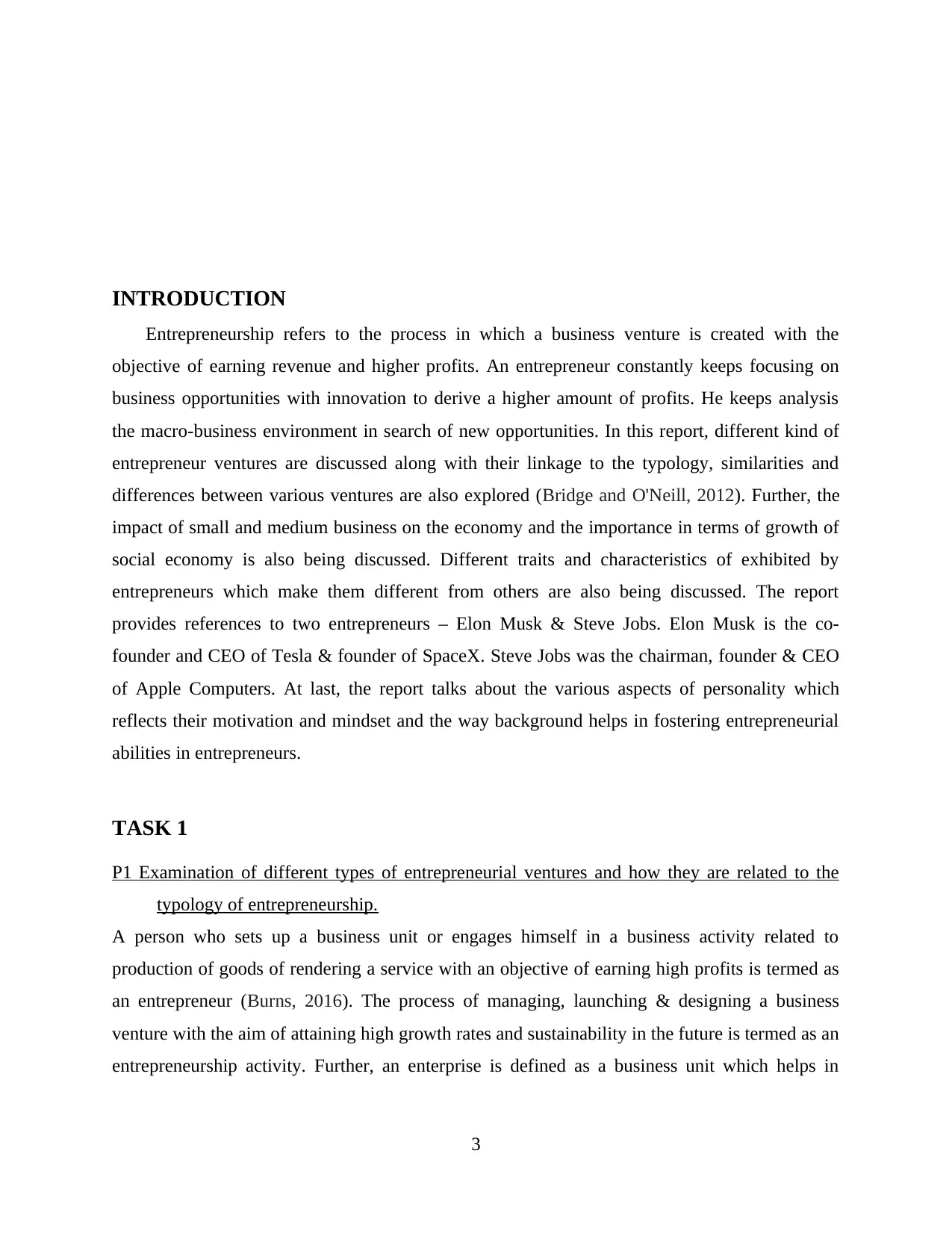
INTRODUCTION
Entrepreneurship refers to the process in which a business venture is created with the
objective of earning revenue and higher profits. An entrepreneur constantly keeps focusing on
business opportunities with innovation to derive a higher amount of profits. He keeps analysis
the macro-business environment in search of new opportunities. In this report, different kind of
entrepreneur ventures are discussed along with their linkage to the typology, similarities and
differences between various ventures are also explored (Bridge and O'Neill, 2012). Further, the
impact of small and medium business on the economy and the importance in terms of growth of
social economy is also being discussed. Different traits and characteristics of exhibited by
entrepreneurs which make them different from others are also being discussed. The report
provides references to two entrepreneurs – Elon Musk & Steve Jobs. Elon Musk is the co-
founder and CEO of Tesla & founder of SpaceX. Steve Jobs was the chairman, founder & CEO
of Apple Computers. At last, the report talks about the various aspects of personality which
reflects their motivation and mindset and the way background helps in fostering entrepreneurial
abilities in entrepreneurs.
TASK 1
P1 Examination of different types of entrepreneurial ventures and how they are related to the
typology of entrepreneurship.
A person who sets up a business unit or engages himself in a business activity related to
production of goods of rendering a service with an objective of earning high profits is termed as
an entrepreneur (Burns, 2016). The process of managing, launching & designing a business
venture with the aim of attaining high growth rates and sustainability in the future is termed as an
entrepreneurship activity. Further, an enterprise is defined as a business unit which helps in
3
Entrepreneurship refers to the process in which a business venture is created with the
objective of earning revenue and higher profits. An entrepreneur constantly keeps focusing on
business opportunities with innovation to derive a higher amount of profits. He keeps analysis
the macro-business environment in search of new opportunities. In this report, different kind of
entrepreneur ventures are discussed along with their linkage to the typology, similarities and
differences between various ventures are also explored (Bridge and O'Neill, 2012). Further, the
impact of small and medium business on the economy and the importance in terms of growth of
social economy is also being discussed. Different traits and characteristics of exhibited by
entrepreneurs which make them different from others are also being discussed. The report
provides references to two entrepreneurs – Elon Musk & Steve Jobs. Elon Musk is the co-
founder and CEO of Tesla & founder of SpaceX. Steve Jobs was the chairman, founder & CEO
of Apple Computers. At last, the report talks about the various aspects of personality which
reflects their motivation and mindset and the way background helps in fostering entrepreneurial
abilities in entrepreneurs.
TASK 1
P1 Examination of different types of entrepreneurial ventures and how they are related to the
typology of entrepreneurship.
A person who sets up a business unit or engages himself in a business activity related to
production of goods of rendering a service with an objective of earning high profits is termed as
an entrepreneur (Burns, 2016). The process of managing, launching & designing a business
venture with the aim of attaining high growth rates and sustainability in the future is termed as an
entrepreneurship activity. Further, an enterprise is defined as a business unit which helps in
3
⊘ This is a preview!⊘
Do you want full access?
Subscribe today to unlock all pages.

Trusted by 1+ million students worldwide
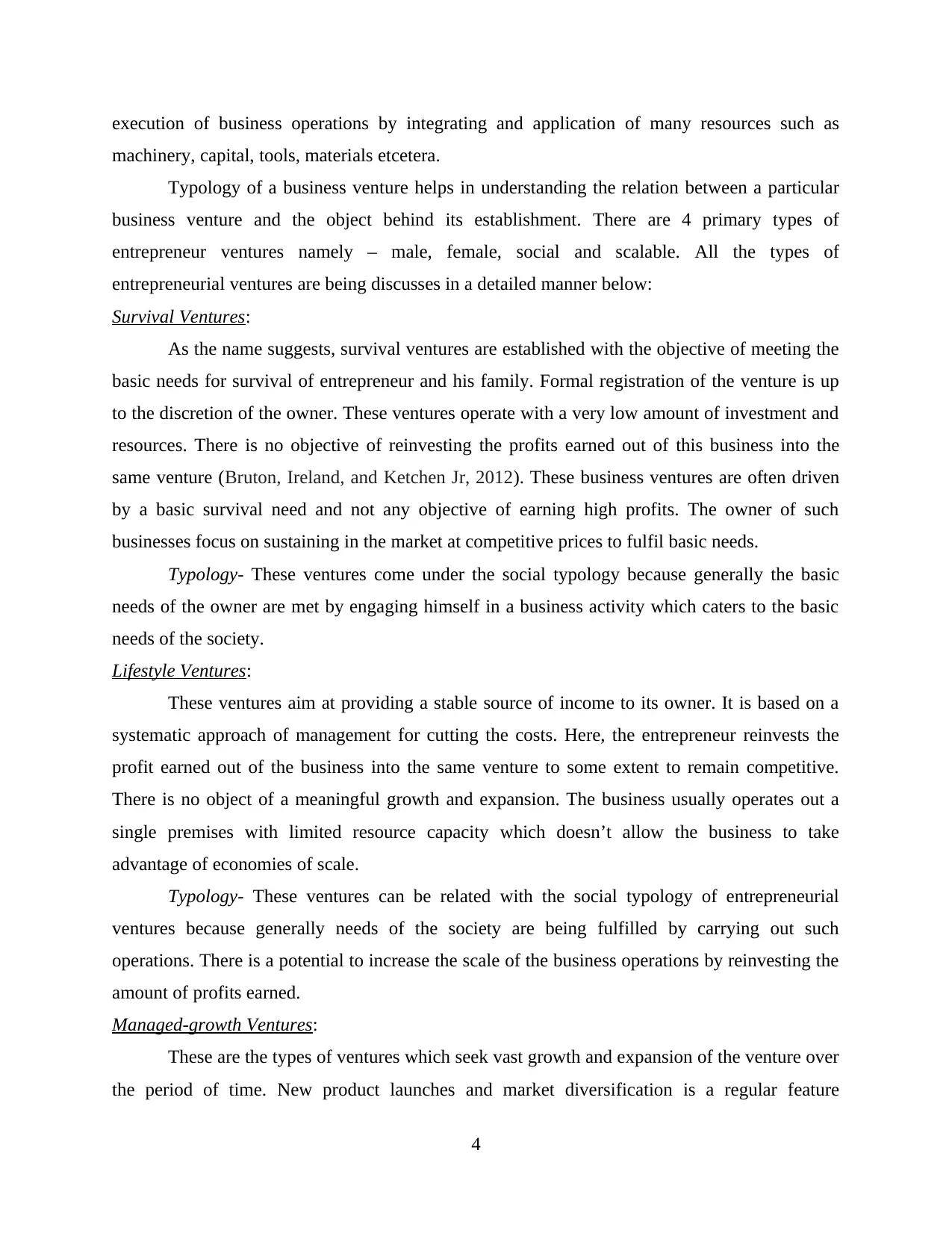
execution of business operations by integrating and application of many resources such as
machinery, capital, tools, materials etcetera.
Typology of a business venture helps in understanding the relation between a particular
business venture and the object behind its establishment. There are 4 primary types of
entrepreneur ventures namely – male, female, social and scalable. All the types of
entrepreneurial ventures are being discusses in a detailed manner below:
Survival Ventures:
As the name suggests, survival ventures are established with the objective of meeting the
basic needs for survival of entrepreneur and his family. Formal registration of the venture is up
to the discretion of the owner. These ventures operate with a very low amount of investment and
resources. There is no objective of reinvesting the profits earned out of this business into the
same venture (Bruton, Ireland, and Ketchen Jr, 2012). These business ventures are often driven
by a basic survival need and not any objective of earning high profits. The owner of such
businesses focus on sustaining in the market at competitive prices to fulfil basic needs.
Typology- These ventures come under the social typology because generally the basic
needs of the owner are met by engaging himself in a business activity which caters to the basic
needs of the society.
Lifestyle Ventures:
These ventures aim at providing a stable source of income to its owner. It is based on a
systematic approach of management for cutting the costs. Here, the entrepreneur reinvests the
profit earned out of the business into the same venture to some extent to remain competitive.
There is no object of a meaningful growth and expansion. The business usually operates out a
single premises with limited resource capacity which doesn’t allow the business to take
advantage of economies of scale.
Typology- These ventures can be related with the social typology of entrepreneurial
ventures because generally needs of the society are being fulfilled by carrying out such
operations. There is a potential to increase the scale of the business operations by reinvesting the
amount of profits earned.
Managed-growth Ventures:
These are the types of ventures which seek vast growth and expansion of the venture over
the period of time. New product launches and market diversification is a regular feature
4
machinery, capital, tools, materials etcetera.
Typology of a business venture helps in understanding the relation between a particular
business venture and the object behind its establishment. There are 4 primary types of
entrepreneur ventures namely – male, female, social and scalable. All the types of
entrepreneurial ventures are being discusses in a detailed manner below:
Survival Ventures:
As the name suggests, survival ventures are established with the objective of meeting the
basic needs for survival of entrepreneur and his family. Formal registration of the venture is up
to the discretion of the owner. These ventures operate with a very low amount of investment and
resources. There is no objective of reinvesting the profits earned out of this business into the
same venture (Bruton, Ireland, and Ketchen Jr, 2012). These business ventures are often driven
by a basic survival need and not any objective of earning high profits. The owner of such
businesses focus on sustaining in the market at competitive prices to fulfil basic needs.
Typology- These ventures come under the social typology because generally the basic
needs of the owner are met by engaging himself in a business activity which caters to the basic
needs of the society.
Lifestyle Ventures:
These ventures aim at providing a stable source of income to its owner. It is based on a
systematic approach of management for cutting the costs. Here, the entrepreneur reinvests the
profit earned out of the business into the same venture to some extent to remain competitive.
There is no object of a meaningful growth and expansion. The business usually operates out a
single premises with limited resource capacity which doesn’t allow the business to take
advantage of economies of scale.
Typology- These ventures can be related with the social typology of entrepreneurial
ventures because generally needs of the society are being fulfilled by carrying out such
operations. There is a potential to increase the scale of the business operations by reinvesting the
amount of profits earned.
Managed-growth Ventures:
These are the types of ventures which seek vast growth and expansion of the venture over
the period of time. New product launches and market diversification is a regular feature
4
Paraphrase This Document
Need a fresh take? Get an instant paraphrase of this document with our AI Paraphraser
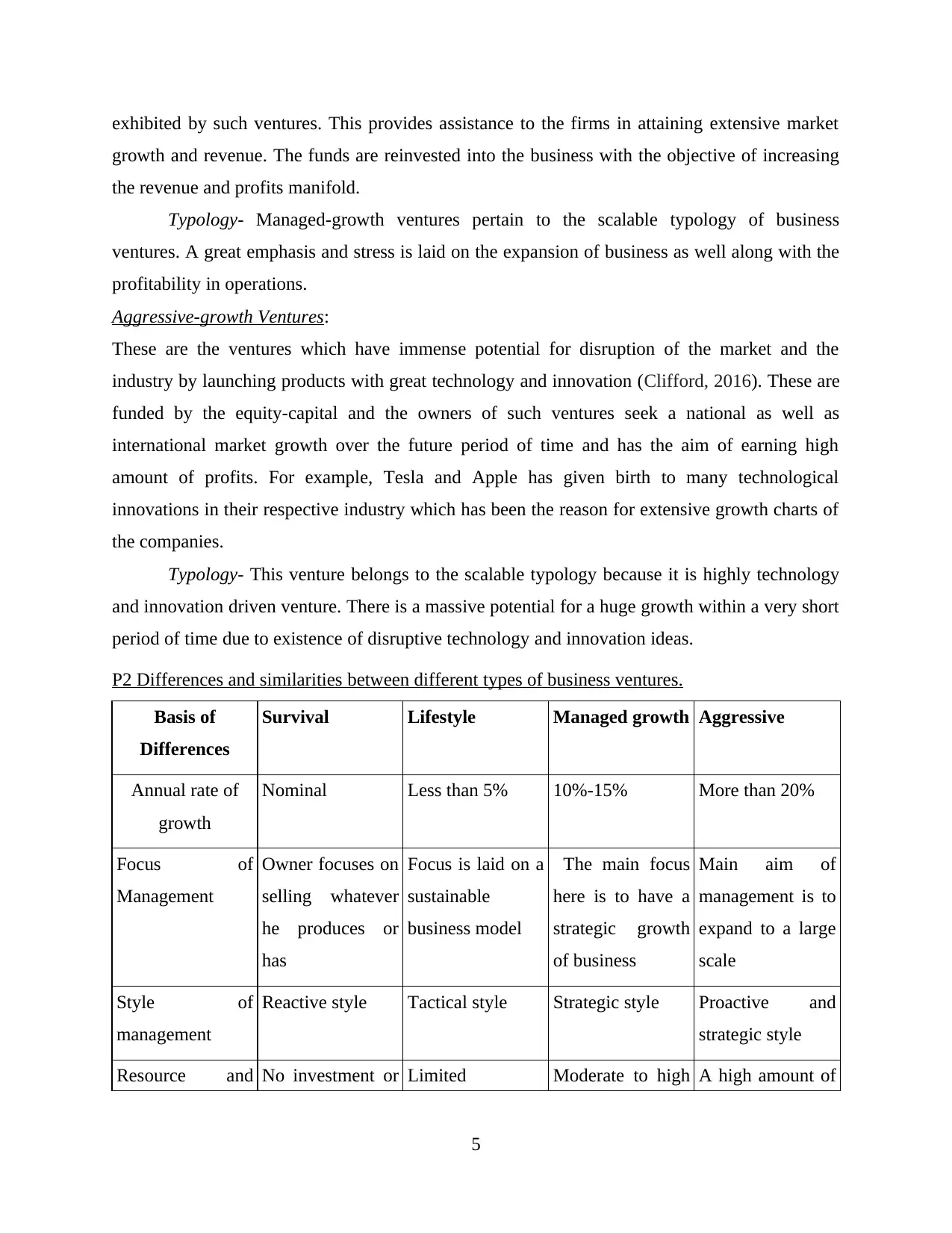
exhibited by such ventures. This provides assistance to the firms in attaining extensive market
growth and revenue. The funds are reinvested into the business with the objective of increasing
the revenue and profits manifold.
Typology- Managed-growth ventures pertain to the scalable typology of business
ventures. A great emphasis and stress is laid on the expansion of business as well along with the
profitability in operations.
Aggressive-growth Ventures:
These are the ventures which have immense potential for disruption of the market and the
industry by launching products with great technology and innovation (Clifford, 2016). These are
funded by the equity-capital and the owners of such ventures seek a national as well as
international market growth over the future period of time and has the aim of earning high
amount of profits. For example, Tesla and Apple has given birth to many technological
innovations in their respective industry which has been the reason for extensive growth charts of
the companies.
Typology- This venture belongs to the scalable typology because it is highly technology
and innovation driven venture. There is a massive potential for a huge growth within a very short
period of time due to existence of disruptive technology and innovation ideas.
P2 Differences and similarities between different types of business ventures.
Basis of
Differences
Survival Lifestyle Managed growth Aggressive
Annual rate of
growth
Nominal Less than 5% 10%-15% More than 20%
Focus of
Management
Owner focuses on
selling whatever
he produces or
has
Focus is laid on a
sustainable
business model
The main focus
here is to have a
strategic growth
of business
Main aim of
management is to
expand to a large
scale
Style of
management
Reactive style Tactical style Strategic style Proactive and
strategic style
Resource and No investment or Limited Moderate to high A high amount of
5
growth and revenue. The funds are reinvested into the business with the objective of increasing
the revenue and profits manifold.
Typology- Managed-growth ventures pertain to the scalable typology of business
ventures. A great emphasis and stress is laid on the expansion of business as well along with the
profitability in operations.
Aggressive-growth Ventures:
These are the ventures which have immense potential for disruption of the market and the
industry by launching products with great technology and innovation (Clifford, 2016). These are
funded by the equity-capital and the owners of such ventures seek a national as well as
international market growth over the future period of time and has the aim of earning high
amount of profits. For example, Tesla and Apple has given birth to many technological
innovations in their respective industry which has been the reason for extensive growth charts of
the companies.
Typology- This venture belongs to the scalable typology because it is highly technology
and innovation driven venture. There is a massive potential for a huge growth within a very short
period of time due to existence of disruptive technology and innovation ideas.
P2 Differences and similarities between different types of business ventures.
Basis of
Differences
Survival Lifestyle Managed growth Aggressive
Annual rate of
growth
Nominal Less than 5% 10%-15% More than 20%
Focus of
Management
Owner focuses on
selling whatever
he produces or
has
Focus is laid on a
sustainable
business model
The main focus
here is to have a
strategic growth
of business
Main aim of
management is to
expand to a large
scale
Style of
management
Reactive style Tactical style Strategic style Proactive and
strategic style
Resource and No investment or Limited Moderate to high A high amount of
5
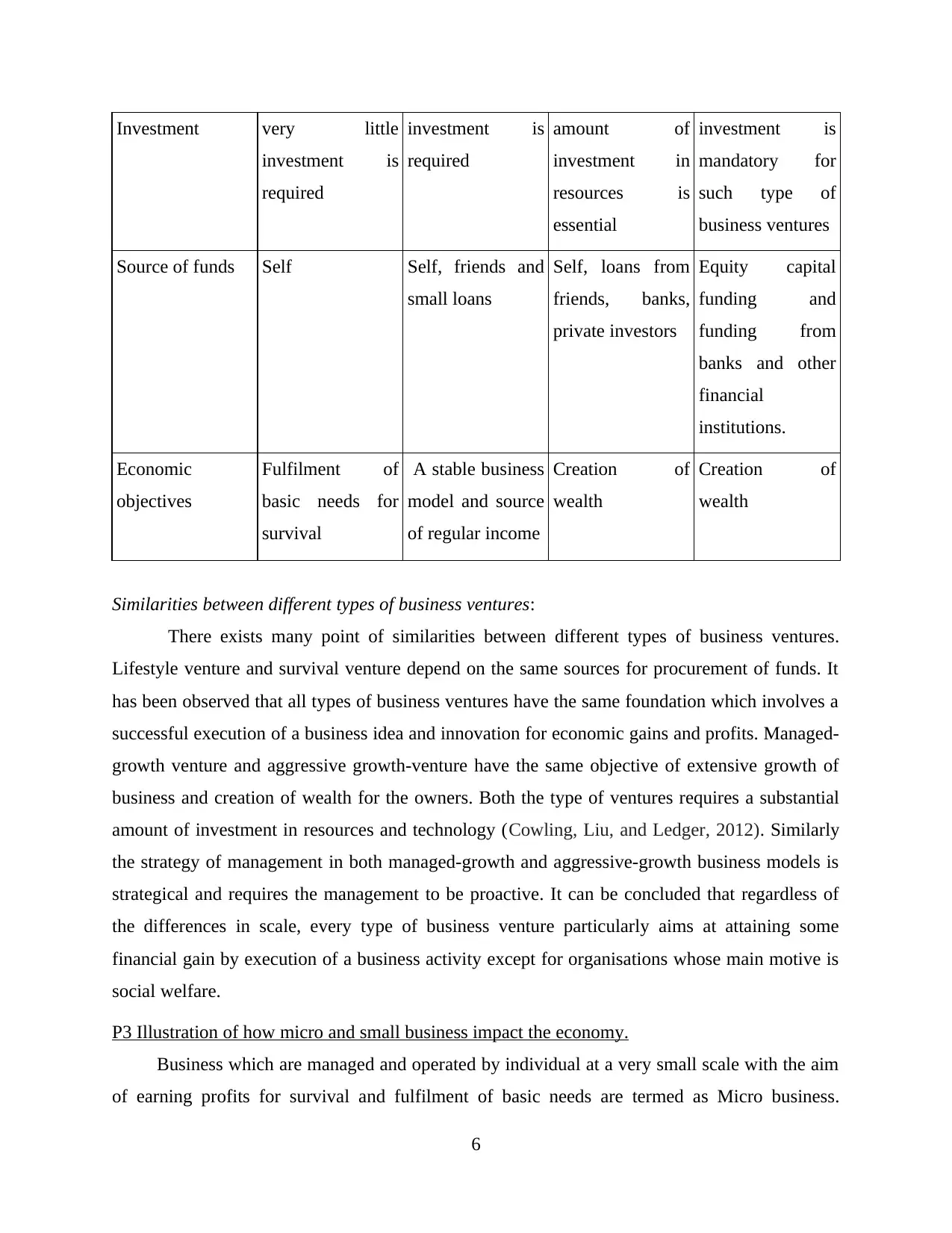
Investment very little
investment is
required
investment is
required
amount of
investment in
resources is
essential
investment is
mandatory for
such type of
business ventures
Source of funds Self Self, friends and
small loans
Self, loans from
friends, banks,
private investors
Equity capital
funding and
funding from
banks and other
financial
institutions.
Economic
objectives
Fulfilment of
basic needs for
survival
A stable business
model and source
of regular income
Creation of
wealth
Creation of
wealth
Similarities between different types of business ventures:
There exists many point of similarities between different types of business ventures.
Lifestyle venture and survival venture depend on the same sources for procurement of funds. It
has been observed that all types of business ventures have the same foundation which involves a
successful execution of a business idea and innovation for economic gains and profits. Managed-
growth venture and aggressive growth-venture have the same objective of extensive growth of
business and creation of wealth for the owners. Both the type of ventures requires a substantial
amount of investment in resources and technology (Cowling, Liu, and Ledger, 2012). Similarly
the strategy of management in both managed-growth and aggressive-growth business models is
strategical and requires the management to be proactive. It can be concluded that regardless of
the differences in scale, every type of business venture particularly aims at attaining some
financial gain by execution of a business activity except for organisations whose main motive is
social welfare.
P3 Illustration of how micro and small business impact the economy.
Business which are managed and operated by individual at a very small scale with the aim
of earning profits for survival and fulfilment of basic needs are termed as Micro business.
6
investment is
required
investment is
required
amount of
investment in
resources is
essential
investment is
mandatory for
such type of
business ventures
Source of funds Self Self, friends and
small loans
Self, loans from
friends, banks,
private investors
Equity capital
funding and
funding from
banks and other
financial
institutions.
Economic
objectives
Fulfilment of
basic needs for
survival
A stable business
model and source
of regular income
Creation of
wealth
Creation of
wealth
Similarities between different types of business ventures:
There exists many point of similarities between different types of business ventures.
Lifestyle venture and survival venture depend on the same sources for procurement of funds. It
has been observed that all types of business ventures have the same foundation which involves a
successful execution of a business idea and innovation for economic gains and profits. Managed-
growth venture and aggressive growth-venture have the same objective of extensive growth of
business and creation of wealth for the owners. Both the type of ventures requires a substantial
amount of investment in resources and technology (Cowling, Liu, and Ledger, 2012). Similarly
the strategy of management in both managed-growth and aggressive-growth business models is
strategical and requires the management to be proactive. It can be concluded that regardless of
the differences in scale, every type of business venture particularly aims at attaining some
financial gain by execution of a business activity except for organisations whose main motive is
social welfare.
P3 Illustration of how micro and small business impact the economy.
Business which are managed and operated by individual at a very small scale with the aim
of earning profits for survival and fulfilment of basic needs are termed as Micro business.
6
⊘ This is a preview!⊘
Do you want full access?
Subscribe today to unlock all pages.

Trusted by 1+ million students worldwide
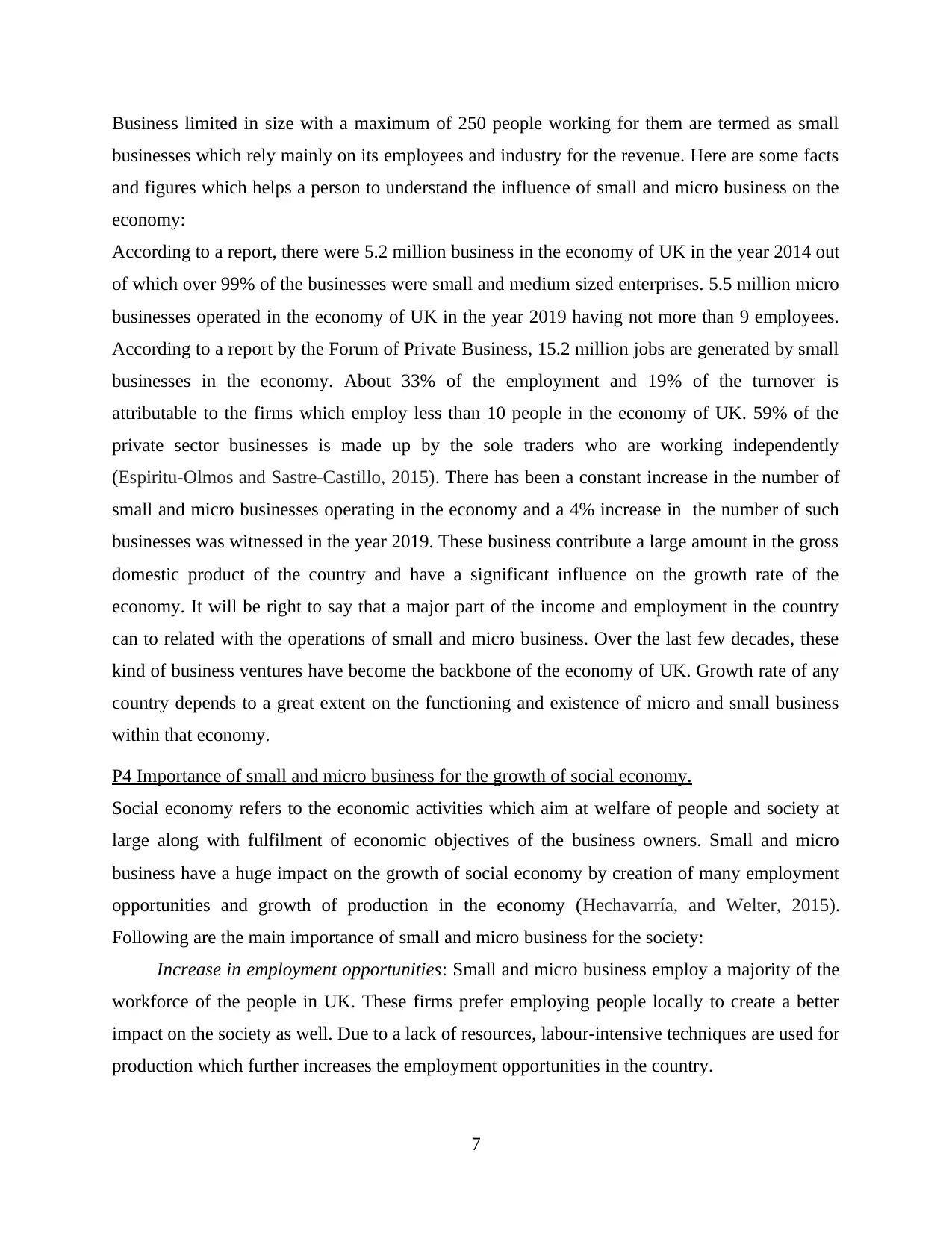
Business limited in size with a maximum of 250 people working for them are termed as small
businesses which rely mainly on its employees and industry for the revenue. Here are some facts
and figures which helps a person to understand the influence of small and micro business on the
economy:
According to a report, there were 5.2 million business in the economy of UK in the year 2014 out
of which over 99% of the businesses were small and medium sized enterprises. 5.5 million micro
businesses operated in the economy of UK in the year 2019 having not more than 9 employees.
According to a report by the Forum of Private Business, 15.2 million jobs are generated by small
businesses in the economy. About 33% of the employment and 19% of the turnover is
attributable to the firms which employ less than 10 people in the economy of UK. 59% of the
private sector businesses is made up by the sole traders who are working independently
(Espiritu-Olmos and Sastre-Castillo, 2015). There has been a constant increase in the number of
small and micro businesses operating in the economy and a 4% increase in the number of such
businesses was witnessed in the year 2019. These business contribute a large amount in the gross
domestic product of the country and have a significant influence on the growth rate of the
economy. It will be right to say that a major part of the income and employment in the country
can to related with the operations of small and micro business. Over the last few decades, these
kind of business ventures have become the backbone of the economy of UK. Growth rate of any
country depends to a great extent on the functioning and existence of micro and small business
within that economy.
P4 Importance of small and micro business for the growth of social economy.
Social economy refers to the economic activities which aim at welfare of people and society at
large along with fulfilment of economic objectives of the business owners. Small and micro
business have a huge impact on the growth of social economy by creation of many employment
opportunities and growth of production in the economy (Hechavarría, and Welter, 2015).
Following are the main importance of small and micro business for the society:
Increase in employment opportunities: Small and micro business employ a majority of the
workforce of the people in UK. These firms prefer employing people locally to create a better
impact on the society as well. Due to a lack of resources, labour-intensive techniques are used for
production which further increases the employment opportunities in the country.
7
businesses which rely mainly on its employees and industry for the revenue. Here are some facts
and figures which helps a person to understand the influence of small and micro business on the
economy:
According to a report, there were 5.2 million business in the economy of UK in the year 2014 out
of which over 99% of the businesses were small and medium sized enterprises. 5.5 million micro
businesses operated in the economy of UK in the year 2019 having not more than 9 employees.
According to a report by the Forum of Private Business, 15.2 million jobs are generated by small
businesses in the economy. About 33% of the employment and 19% of the turnover is
attributable to the firms which employ less than 10 people in the economy of UK. 59% of the
private sector businesses is made up by the sole traders who are working independently
(Espiritu-Olmos and Sastre-Castillo, 2015). There has been a constant increase in the number of
small and micro businesses operating in the economy and a 4% increase in the number of such
businesses was witnessed in the year 2019. These business contribute a large amount in the gross
domestic product of the country and have a significant influence on the growth rate of the
economy. It will be right to say that a major part of the income and employment in the country
can to related with the operations of small and micro business. Over the last few decades, these
kind of business ventures have become the backbone of the economy of UK. Growth rate of any
country depends to a great extent on the functioning and existence of micro and small business
within that economy.
P4 Importance of small and micro business for the growth of social economy.
Social economy refers to the economic activities which aim at welfare of people and society at
large along with fulfilment of economic objectives of the business owners. Small and micro
business have a huge impact on the growth of social economy by creation of many employment
opportunities and growth of production in the economy (Hechavarría, and Welter, 2015).
Following are the main importance of small and micro business for the society:
Increase in employment opportunities: Small and micro business employ a majority of the
workforce of the people in UK. These firms prefer employing people locally to create a better
impact on the society as well. Due to a lack of resources, labour-intensive techniques are used for
production which further increases the employment opportunities in the country.
7
Paraphrase This Document
Need a fresh take? Get an instant paraphrase of this document with our AI Paraphraser
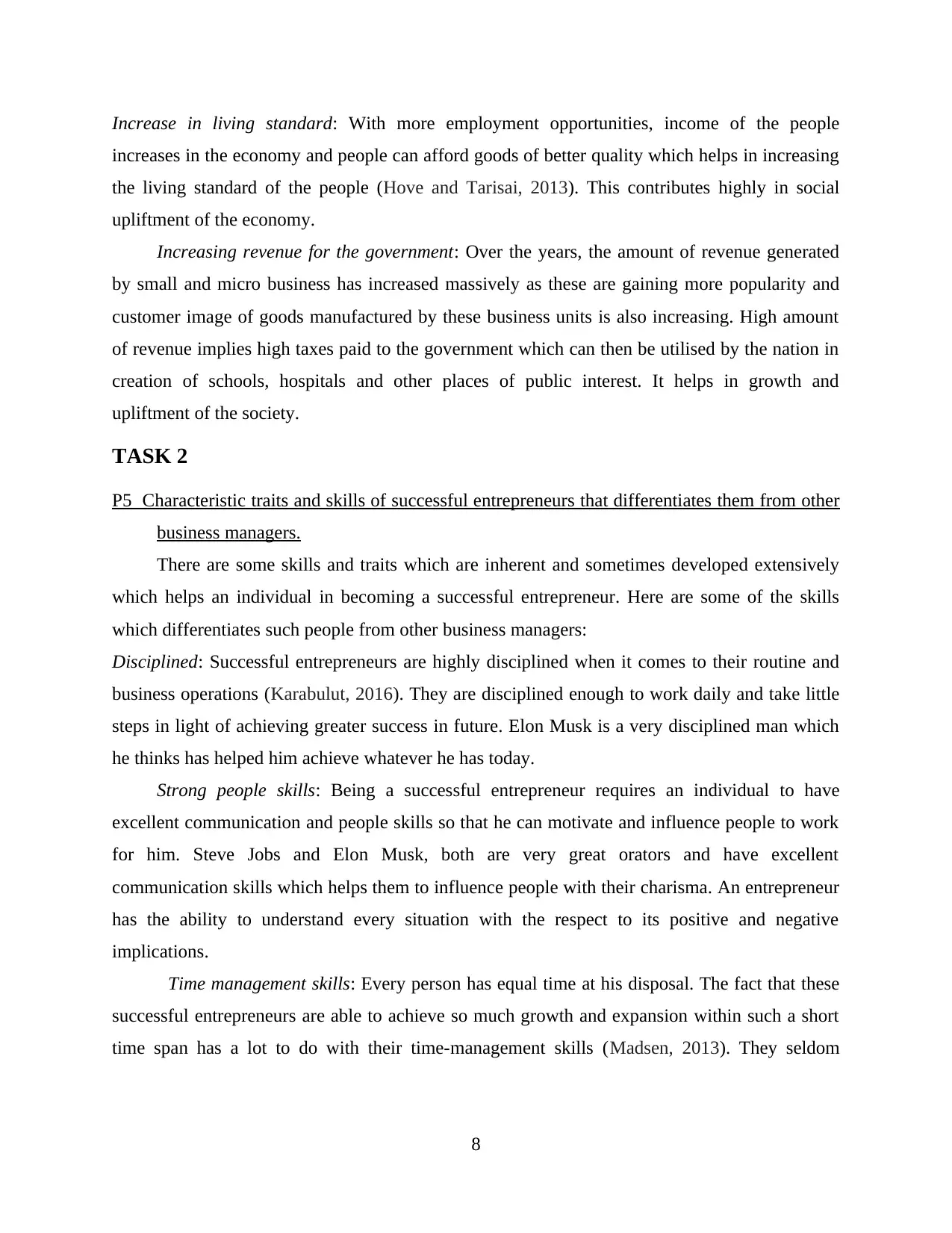
Increase in living standard: With more employment opportunities, income of the people
increases in the economy and people can afford goods of better quality which helps in increasing
the living standard of the people (Hove and Tarisai, 2013). This contributes highly in social
upliftment of the economy.
Increasing revenue for the government: Over the years, the amount of revenue generated
by small and micro business has increased massively as these are gaining more popularity and
customer image of goods manufactured by these business units is also increasing. High amount
of revenue implies high taxes paid to the government which can then be utilised by the nation in
creation of schools, hospitals and other places of public interest. It helps in growth and
upliftment of the society.
TASK 2
P5 Characteristic traits and skills of successful entrepreneurs that differentiates them from other
business managers.
There are some skills and traits which are inherent and sometimes developed extensively
which helps an individual in becoming a successful entrepreneur. Here are some of the skills
which differentiates such people from other business managers:
Disciplined: Successful entrepreneurs are highly disciplined when it comes to their routine and
business operations (Karabulut, 2016). They are disciplined enough to work daily and take little
steps in light of achieving greater success in future. Elon Musk is a very disciplined man which
he thinks has helped him achieve whatever he has today.
Strong people skills: Being a successful entrepreneur requires an individual to have
excellent communication and people skills so that he can motivate and influence people to work
for him. Steve Jobs and Elon Musk, both are very great orators and have excellent
communication skills which helps them to influence people with their charisma. An entrepreneur
has the ability to understand every situation with the respect to its positive and negative
implications.
Time management skills: Every person has equal time at his disposal. The fact that these
successful entrepreneurs are able to achieve so much growth and expansion within such a short
time span has a lot to do with their time-management skills (Madsen, 2013). They seldom
8
increases in the economy and people can afford goods of better quality which helps in increasing
the living standard of the people (Hove and Tarisai, 2013). This contributes highly in social
upliftment of the economy.
Increasing revenue for the government: Over the years, the amount of revenue generated
by small and micro business has increased massively as these are gaining more popularity and
customer image of goods manufactured by these business units is also increasing. High amount
of revenue implies high taxes paid to the government which can then be utilised by the nation in
creation of schools, hospitals and other places of public interest. It helps in growth and
upliftment of the society.
TASK 2
P5 Characteristic traits and skills of successful entrepreneurs that differentiates them from other
business managers.
There are some skills and traits which are inherent and sometimes developed extensively
which helps an individual in becoming a successful entrepreneur. Here are some of the skills
which differentiates such people from other business managers:
Disciplined: Successful entrepreneurs are highly disciplined when it comes to their routine and
business operations (Karabulut, 2016). They are disciplined enough to work daily and take little
steps in light of achieving greater success in future. Elon Musk is a very disciplined man which
he thinks has helped him achieve whatever he has today.
Strong people skills: Being a successful entrepreneur requires an individual to have
excellent communication and people skills so that he can motivate and influence people to work
for him. Steve Jobs and Elon Musk, both are very great orators and have excellent
communication skills which helps them to influence people with their charisma. An entrepreneur
has the ability to understand every situation with the respect to its positive and negative
implications.
Time management skills: Every person has equal time at his disposal. The fact that these
successful entrepreneurs are able to achieve so much growth and expansion within such a short
time span has a lot to do with their time-management skills (Madsen, 2013). They seldom
8
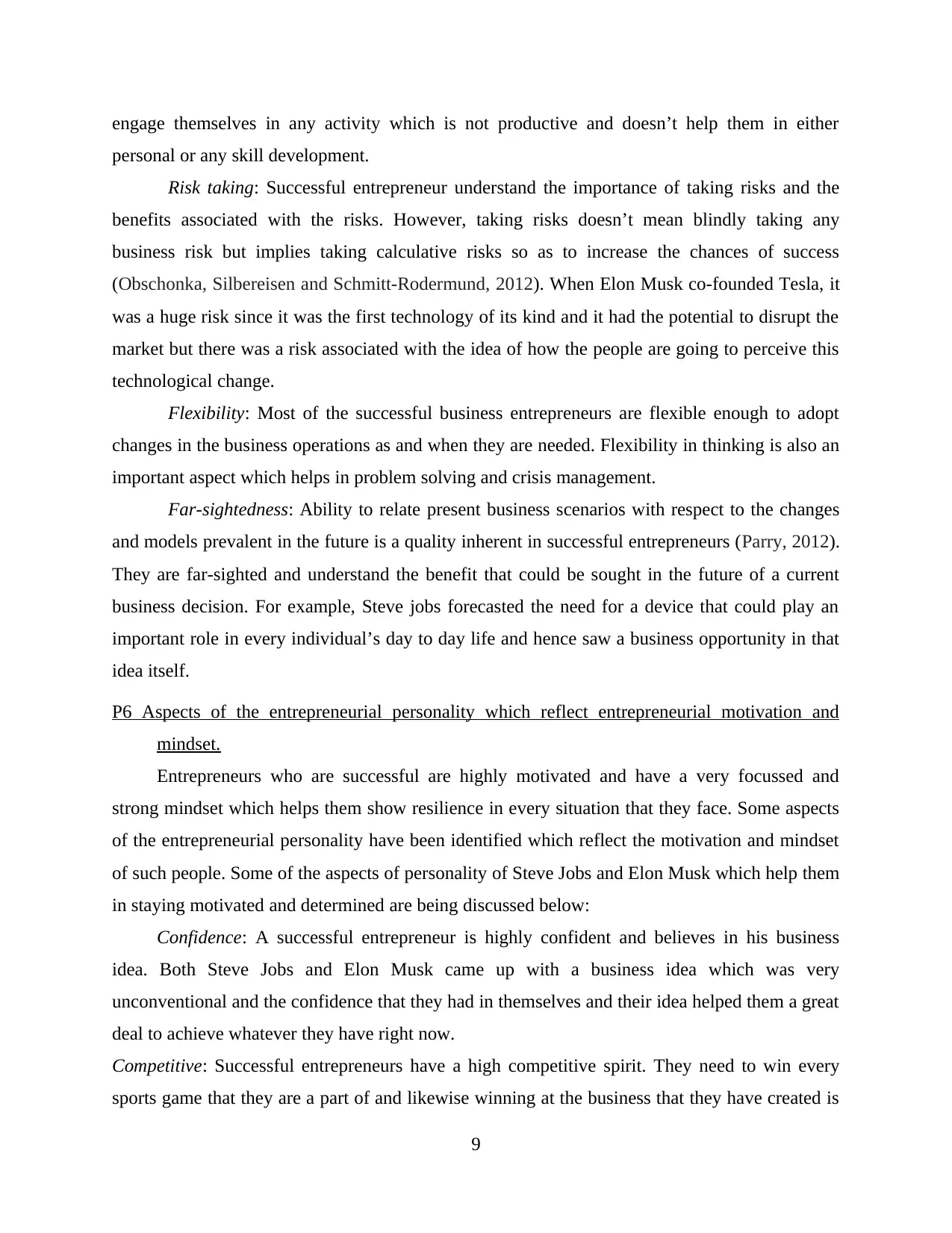
engage themselves in any activity which is not productive and doesn’t help them in either
personal or any skill development.
Risk taking: Successful entrepreneur understand the importance of taking risks and the
benefits associated with the risks. However, taking risks doesn’t mean blindly taking any
business risk but implies taking calculative risks so as to increase the chances of success
(Obschonka, Silbereisen and Schmitt‐Rodermund, 2012). When Elon Musk co-founded Tesla, it
was a huge risk since it was the first technology of its kind and it had the potential to disrupt the
market but there was a risk associated with the idea of how the people are going to perceive this
technological change.
Flexibility: Most of the successful business entrepreneurs are flexible enough to adopt
changes in the business operations as and when they are needed. Flexibility in thinking is also an
important aspect which helps in problem solving and crisis management.
Far-sightedness: Ability to relate present business scenarios with respect to the changes
and models prevalent in the future is a quality inherent in successful entrepreneurs (Parry, 2012).
They are far-sighted and understand the benefit that could be sought in the future of a current
business decision. For example, Steve jobs forecasted the need for a device that could play an
important role in every individual’s day to day life and hence saw a business opportunity in that
idea itself.
P6 Aspects of the entrepreneurial personality which reflect entrepreneurial motivation and
mindset.
Entrepreneurs who are successful are highly motivated and have a very focussed and
strong mindset which helps them show resilience in every situation that they face. Some aspects
of the entrepreneurial personality have been identified which reflect the motivation and mindset
of such people. Some of the aspects of personality of Steve Jobs and Elon Musk which help them
in staying motivated and determined are being discussed below:
Confidence: A successful entrepreneur is highly confident and believes in his business
idea. Both Steve Jobs and Elon Musk came up with a business idea which was very
unconventional and the confidence that they had in themselves and their idea helped them a great
deal to achieve whatever they have right now.
Competitive: Successful entrepreneurs have a high competitive spirit. They need to win every
sports game that they are a part of and likewise winning at the business that they have created is
9
personal or any skill development.
Risk taking: Successful entrepreneur understand the importance of taking risks and the
benefits associated with the risks. However, taking risks doesn’t mean blindly taking any
business risk but implies taking calculative risks so as to increase the chances of success
(Obschonka, Silbereisen and Schmitt‐Rodermund, 2012). When Elon Musk co-founded Tesla, it
was a huge risk since it was the first technology of its kind and it had the potential to disrupt the
market but there was a risk associated with the idea of how the people are going to perceive this
technological change.
Flexibility: Most of the successful business entrepreneurs are flexible enough to adopt
changes in the business operations as and when they are needed. Flexibility in thinking is also an
important aspect which helps in problem solving and crisis management.
Far-sightedness: Ability to relate present business scenarios with respect to the changes
and models prevalent in the future is a quality inherent in successful entrepreneurs (Parry, 2012).
They are far-sighted and understand the benefit that could be sought in the future of a current
business decision. For example, Steve jobs forecasted the need for a device that could play an
important role in every individual’s day to day life and hence saw a business opportunity in that
idea itself.
P6 Aspects of the entrepreneurial personality which reflect entrepreneurial motivation and
mindset.
Entrepreneurs who are successful are highly motivated and have a very focussed and
strong mindset which helps them show resilience in every situation that they face. Some aspects
of the entrepreneurial personality have been identified which reflect the motivation and mindset
of such people. Some of the aspects of personality of Steve Jobs and Elon Musk which help them
in staying motivated and determined are being discussed below:
Confidence: A successful entrepreneur is highly confident and believes in his business
idea. Both Steve Jobs and Elon Musk came up with a business idea which was very
unconventional and the confidence that they had in themselves and their idea helped them a great
deal to achieve whatever they have right now.
Competitive: Successful entrepreneurs have a high competitive spirit. They need to win every
sports game that they are a part of and likewise winning at the business that they have created is
9
⊘ This is a preview!⊘
Do you want full access?
Subscribe today to unlock all pages.

Trusted by 1+ million students worldwide
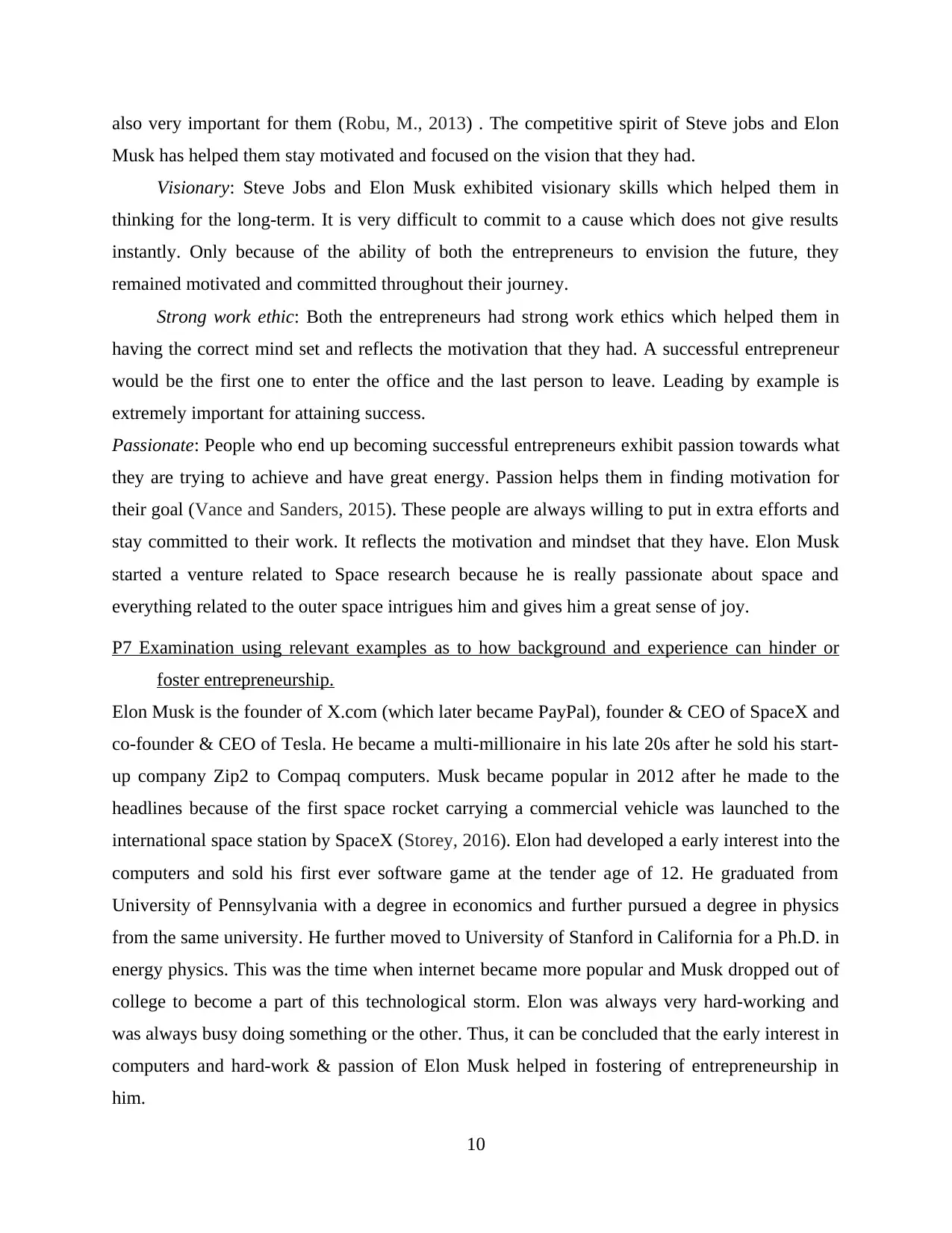
also very important for them (Robu, M., 2013) . The competitive spirit of Steve jobs and Elon
Musk has helped them stay motivated and focused on the vision that they had.
Visionary: Steve Jobs and Elon Musk exhibited visionary skills which helped them in
thinking for the long-term. It is very difficult to commit to a cause which does not give results
instantly. Only because of the ability of both the entrepreneurs to envision the future, they
remained motivated and committed throughout their journey.
Strong work ethic: Both the entrepreneurs had strong work ethics which helped them in
having the correct mind set and reflects the motivation that they had. A successful entrepreneur
would be the first one to enter the office and the last person to leave. Leading by example is
extremely important for attaining success.
Passionate: People who end up becoming successful entrepreneurs exhibit passion towards what
they are trying to achieve and have great energy. Passion helps them in finding motivation for
their goal (Vance and Sanders, 2015). These people are always willing to put in extra efforts and
stay committed to their work. It reflects the motivation and mindset that they have. Elon Musk
started a venture related to Space research because he is really passionate about space and
everything related to the outer space intrigues him and gives him a great sense of joy.
P7 Examination using relevant examples as to how background and experience can hinder or
foster entrepreneurship.
Elon Musk is the founder of X.com (which later became PayPal), founder & CEO of SpaceX and
co-founder & CEO of Tesla. He became a multi-millionaire in his late 20s after he sold his start-
up company Zip2 to Compaq computers. Musk became popular in 2012 after he made to the
headlines because of the first space rocket carrying a commercial vehicle was launched to the
international space station by SpaceX (Storey, 2016). Elon had developed a early interest into the
computers and sold his first ever software game at the tender age of 12. He graduated from
University of Pennsylvania with a degree in economics and further pursued a degree in physics
from the same university. He further moved to University of Stanford in California for a Ph.D. in
energy physics. This was the time when internet became more popular and Musk dropped out of
college to become a part of this technological storm. Elon was always very hard-working and
was always busy doing something or the other. Thus, it can be concluded that the early interest in
computers and hard-work & passion of Elon Musk helped in fostering of entrepreneurship in
him.
10
Musk has helped them stay motivated and focused on the vision that they had.
Visionary: Steve Jobs and Elon Musk exhibited visionary skills which helped them in
thinking for the long-term. It is very difficult to commit to a cause which does not give results
instantly. Only because of the ability of both the entrepreneurs to envision the future, they
remained motivated and committed throughout their journey.
Strong work ethic: Both the entrepreneurs had strong work ethics which helped them in
having the correct mind set and reflects the motivation that they had. A successful entrepreneur
would be the first one to enter the office and the last person to leave. Leading by example is
extremely important for attaining success.
Passionate: People who end up becoming successful entrepreneurs exhibit passion towards what
they are trying to achieve and have great energy. Passion helps them in finding motivation for
their goal (Vance and Sanders, 2015). These people are always willing to put in extra efforts and
stay committed to their work. It reflects the motivation and mindset that they have. Elon Musk
started a venture related to Space research because he is really passionate about space and
everything related to the outer space intrigues him and gives him a great sense of joy.
P7 Examination using relevant examples as to how background and experience can hinder or
foster entrepreneurship.
Elon Musk is the founder of X.com (which later became PayPal), founder & CEO of SpaceX and
co-founder & CEO of Tesla. He became a multi-millionaire in his late 20s after he sold his start-
up company Zip2 to Compaq computers. Musk became popular in 2012 after he made to the
headlines because of the first space rocket carrying a commercial vehicle was launched to the
international space station by SpaceX (Storey, 2016). Elon had developed a early interest into the
computers and sold his first ever software game at the tender age of 12. He graduated from
University of Pennsylvania with a degree in economics and further pursued a degree in physics
from the same university. He further moved to University of Stanford in California for a Ph.D. in
energy physics. This was the time when internet became more popular and Musk dropped out of
college to become a part of this technological storm. Elon was always very hard-working and
was always busy doing something or the other. Thus, it can be concluded that the early interest in
computers and hard-work & passion of Elon Musk helped in fostering of entrepreneurship in
him.
10
Paraphrase This Document
Need a fresh take? Get an instant paraphrase of this document with our AI Paraphraser
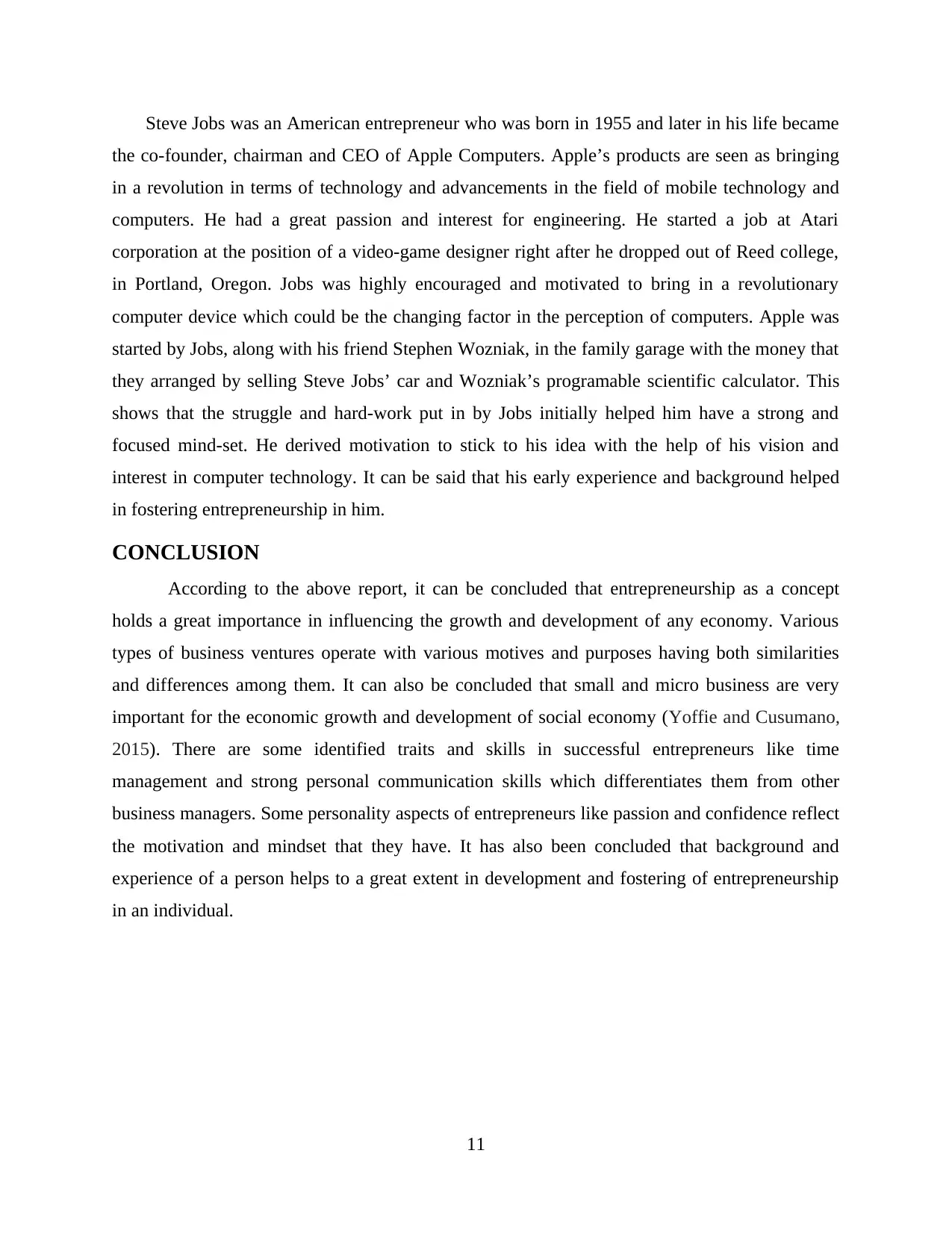
Steve Jobs was an American entrepreneur who was born in 1955 and later in his life became
the co-founder, chairman and CEO of Apple Computers. Apple’s products are seen as bringing
in a revolution in terms of technology and advancements in the field of mobile technology and
computers. He had a great passion and interest for engineering. He started a job at Atari
corporation at the position of a video-game designer right after he dropped out of Reed college,
in Portland, Oregon. Jobs was highly encouraged and motivated to bring in a revolutionary
computer device which could be the changing factor in the perception of computers. Apple was
started by Jobs, along with his friend Stephen Wozniak, in the family garage with the money that
they arranged by selling Steve Jobs’ car and Wozniak’s programable scientific calculator. This
shows that the struggle and hard-work put in by Jobs initially helped him have a strong and
focused mind-set. He derived motivation to stick to his idea with the help of his vision and
interest in computer technology. It can be said that his early experience and background helped
in fostering entrepreneurship in him.
CONCLUSION
According to the above report, it can be concluded that entrepreneurship as a concept
holds a great importance in influencing the growth and development of any economy. Various
types of business ventures operate with various motives and purposes having both similarities
and differences among them. It can also be concluded that small and micro business are very
important for the economic growth and development of social economy (Yoffie and Cusumano,
2015). There are some identified traits and skills in successful entrepreneurs like time
management and strong personal communication skills which differentiates them from other
business managers. Some personality aspects of entrepreneurs like passion and confidence reflect
the motivation and mindset that they have. It has also been concluded that background and
experience of a person helps to a great extent in development and fostering of entrepreneurship
in an individual.
11
the co-founder, chairman and CEO of Apple Computers. Apple’s products are seen as bringing
in a revolution in terms of technology and advancements in the field of mobile technology and
computers. He had a great passion and interest for engineering. He started a job at Atari
corporation at the position of a video-game designer right after he dropped out of Reed college,
in Portland, Oregon. Jobs was highly encouraged and motivated to bring in a revolutionary
computer device which could be the changing factor in the perception of computers. Apple was
started by Jobs, along with his friend Stephen Wozniak, in the family garage with the money that
they arranged by selling Steve Jobs’ car and Wozniak’s programable scientific calculator. This
shows that the struggle and hard-work put in by Jobs initially helped him have a strong and
focused mind-set. He derived motivation to stick to his idea with the help of his vision and
interest in computer technology. It can be said that his early experience and background helped
in fostering entrepreneurship in him.
CONCLUSION
According to the above report, it can be concluded that entrepreneurship as a concept
holds a great importance in influencing the growth and development of any economy. Various
types of business ventures operate with various motives and purposes having both similarities
and differences among them. It can also be concluded that small and micro business are very
important for the economic growth and development of social economy (Yoffie and Cusumano,
2015). There are some identified traits and skills in successful entrepreneurs like time
management and strong personal communication skills which differentiates them from other
business managers. Some personality aspects of entrepreneurs like passion and confidence reflect
the motivation and mindset that they have. It has also been concluded that background and
experience of a person helps to a great extent in development and fostering of entrepreneurship
in an individual.
11
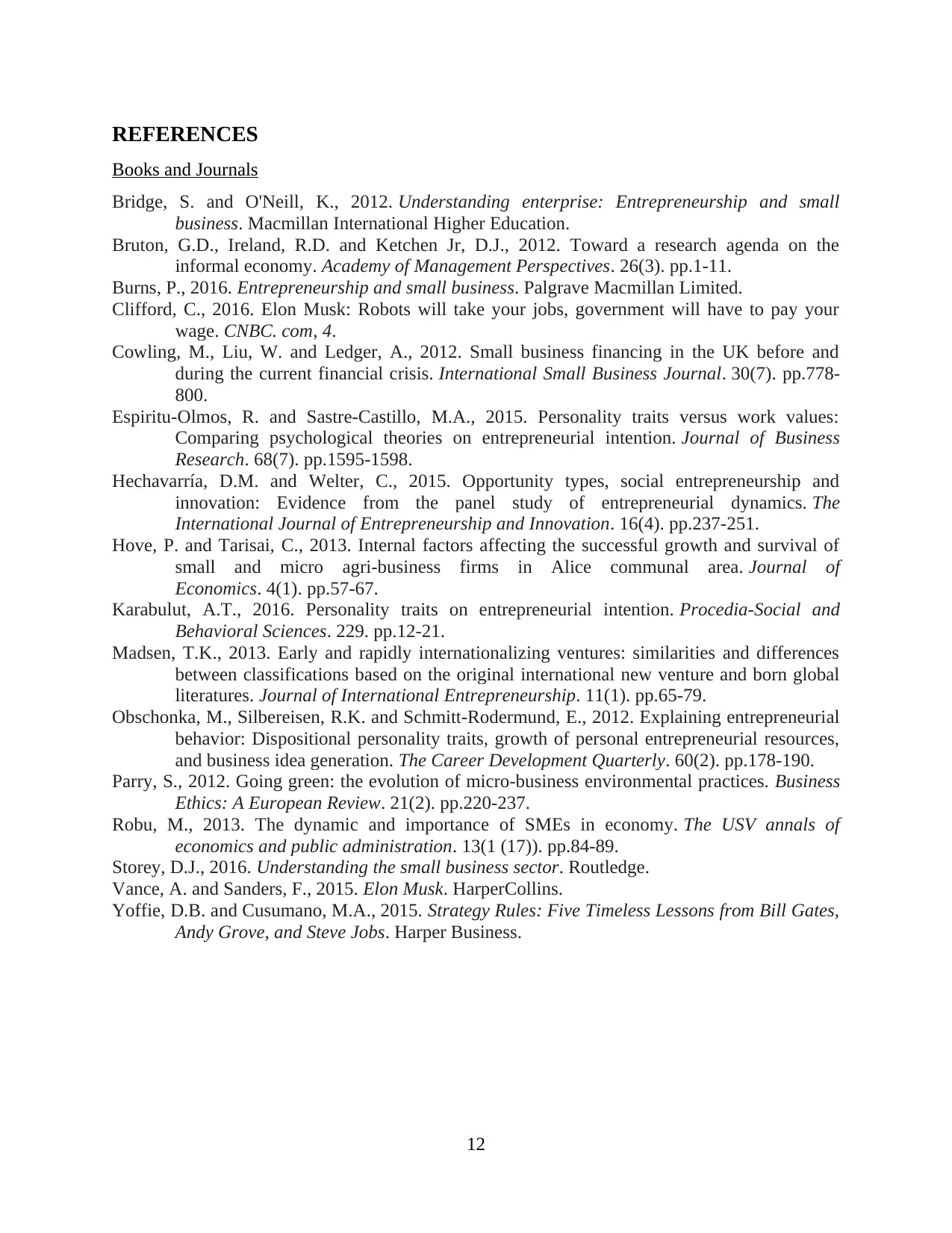
REFERENCES
Books and Journals
Bridge, S. and O'Neill, K., 2012. Understanding enterprise: Entrepreneurship and small
business. Macmillan International Higher Education.
Bruton, G.D., Ireland, R.D. and Ketchen Jr, D.J., 2012. Toward a research agenda on the
informal economy. Academy of Management Perspectives. 26(3). pp.1-11.
Burns, P., 2016. Entrepreneurship and small business. Palgrave Macmillan Limited.
Clifford, C., 2016. Elon Musk: Robots will take your jobs, government will have to pay your
wage. CNBC. com, 4.
Cowling, M., Liu, W. and Ledger, A., 2012. Small business financing in the UK before and
during the current financial crisis. International Small Business Journal. 30(7). pp.778-
800.
Espiritu-Olmos, R. and Sastre-Castillo, M.A., 2015. Personality traits versus work values:
Comparing psychological theories on entrepreneurial intention. Journal of Business
Research. 68(7). pp.1595-1598.
Hechavarría, D.M. and Welter, C., 2015. Opportunity types, social entrepreneurship and
innovation: Evidence from the panel study of entrepreneurial dynamics. The
International Journal of Entrepreneurship and Innovation. 16(4). pp.237-251.
Hove, P. and Tarisai, C., 2013. Internal factors affecting the successful growth and survival of
small and micro agri-business firms in Alice communal area. Journal of
Economics. 4(1). pp.57-67.
Karabulut, A.T., 2016. Personality traits on entrepreneurial intention. Procedia-Social and
Behavioral Sciences. 229. pp.12-21.
Madsen, T.K., 2013. Early and rapidly internationalizing ventures: similarities and differences
between classifications based on the original international new venture and born global
literatures. Journal of International Entrepreneurship. 11(1). pp.65-79.
Obschonka, M., Silbereisen, R.K. and Schmitt‐Rodermund, E., 2012. Explaining entrepreneurial
behavior: Dispositional personality traits, growth of personal entrepreneurial resources,
and business idea generation. The Career Development Quarterly. 60(2). pp.178-190.
Parry, S., 2012. Going green: the evolution of micro‐business environmental practices. Business
Ethics: A European Review. 21(2). pp.220-237.
Robu, M., 2013. The dynamic and importance of SMEs in economy. The USV annals of
economics and public administration. 13(1 (17)). pp.84-89.
Storey, D.J., 2016. Understanding the small business sector. Routledge.
Vance, A. and Sanders, F., 2015. Elon Musk. HarperCollins.
Yoffie, D.B. and Cusumano, M.A., 2015. Strategy Rules: Five Timeless Lessons from Bill Gates,
Andy Grove, and Steve Jobs. Harper Business.
12
Books and Journals
Bridge, S. and O'Neill, K., 2012. Understanding enterprise: Entrepreneurship and small
business. Macmillan International Higher Education.
Bruton, G.D., Ireland, R.D. and Ketchen Jr, D.J., 2012. Toward a research agenda on the
informal economy. Academy of Management Perspectives. 26(3). pp.1-11.
Burns, P., 2016. Entrepreneurship and small business. Palgrave Macmillan Limited.
Clifford, C., 2016. Elon Musk: Robots will take your jobs, government will have to pay your
wage. CNBC. com, 4.
Cowling, M., Liu, W. and Ledger, A., 2012. Small business financing in the UK before and
during the current financial crisis. International Small Business Journal. 30(7). pp.778-
800.
Espiritu-Olmos, R. and Sastre-Castillo, M.A., 2015. Personality traits versus work values:
Comparing psychological theories on entrepreneurial intention. Journal of Business
Research. 68(7). pp.1595-1598.
Hechavarría, D.M. and Welter, C., 2015. Opportunity types, social entrepreneurship and
innovation: Evidence from the panel study of entrepreneurial dynamics. The
International Journal of Entrepreneurship and Innovation. 16(4). pp.237-251.
Hove, P. and Tarisai, C., 2013. Internal factors affecting the successful growth and survival of
small and micro agri-business firms in Alice communal area. Journal of
Economics. 4(1). pp.57-67.
Karabulut, A.T., 2016. Personality traits on entrepreneurial intention. Procedia-Social and
Behavioral Sciences. 229. pp.12-21.
Madsen, T.K., 2013. Early and rapidly internationalizing ventures: similarities and differences
between classifications based on the original international new venture and born global
literatures. Journal of International Entrepreneurship. 11(1). pp.65-79.
Obschonka, M., Silbereisen, R.K. and Schmitt‐Rodermund, E., 2012. Explaining entrepreneurial
behavior: Dispositional personality traits, growth of personal entrepreneurial resources,
and business idea generation. The Career Development Quarterly. 60(2). pp.178-190.
Parry, S., 2012. Going green: the evolution of micro‐business environmental practices. Business
Ethics: A European Review. 21(2). pp.220-237.
Robu, M., 2013. The dynamic and importance of SMEs in economy. The USV annals of
economics and public administration. 13(1 (17)). pp.84-89.
Storey, D.J., 2016. Understanding the small business sector. Routledge.
Vance, A. and Sanders, F., 2015. Elon Musk. HarperCollins.
Yoffie, D.B. and Cusumano, M.A., 2015. Strategy Rules: Five Timeless Lessons from Bill Gates,
Andy Grove, and Steve Jobs. Harper Business.
12
⊘ This is a preview!⊘
Do you want full access?
Subscribe today to unlock all pages.

Trusted by 1+ million students worldwide
1 out of 12
Related Documents
Your All-in-One AI-Powered Toolkit for Academic Success.
+13062052269
info@desklib.com
Available 24*7 on WhatsApp / Email
![[object Object]](/_next/static/media/star-bottom.7253800d.svg)
Unlock your academic potential
Copyright © 2020–2026 A2Z Services. All Rights Reserved. Developed and managed by ZUCOL.




